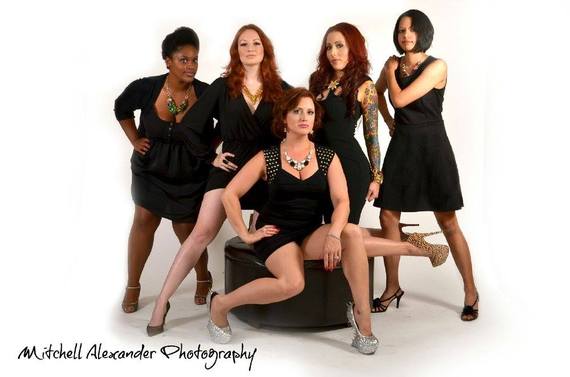How Highly Gendered Toys Present an Exclusively Heterosexual Worldview to Children
When I was a child, these are some of the things I saw in daily life:
• Books, movies and TV shows about husbands and wives, boyfriends
and girlfriends
• Paintings of male/female couples
• Wedding books, photo albums, gowns, bride-and-groom cake
toppers and other wedding-related items
• Men and women walking down the street holding hands
• Math worksheets with word problems about Susie’s mommy
and Susie’s daddy
• Barbie and Ken
The list goes on forever.
Today’s children are more likely to see two men or two women holding hands, more likely to have a friend or relative who is openly gay and more likely to have a schoolmate who has two moms or two dads. But when girls and boys walk into a toy store in 2015, they see a significantly more gendered, heteronormative arrangement and selection of toys than I did as a girl forty years ago! Toys, grouped by gender, are prescriptive of gender roles. It is not only a problem of limiting the ways to be a girl or a boy, as I have written about extensively. It is also a problem of promoting an exclusively heterosexual worldview.
In the boy aisle are the toys that show boys they will become men and husbands who work outside the home at a variety of exciting jobs, make important discoveries, run/jump/play and impact the environment (by fighting, building, solving problems and mysteries and using superpowers to save the world).
Girls learn the yin to the boys’ yang. They see a toy aisle that tells them they will become women and wives who work inside the home, who spend a lot of time cultivating their physical appearance, who focus on attracting males, who are physically sedentary and passive, and who raise babies, cook and clean.
The two aisles can be taken together to represent the heterosexual couple — the bride and groom, but in a decidedly archaic depiction of marriage. Obviously, this message is not a healthy one for raising strong, empowered girls or sensitive, nurturing boys, but it is also unhealthy for any child who is gender-nonconforming or who will not grow up to fulfill traditional heterosexual gender roles.
For the child who does not like the trappings that the world rigidly assigns to his or her gender, or who knows somewhere deep inside that he or she does not fit into the world of play that is presented as all there is, there is discomfort. There is confusion. And often, there is compliance and a very private, perhaps entirely secret thought process that goes something like this: I am not like other girls. I am a girl, but I like the things in the boy aisle. But I can’t go over there, or I could get teased. People will think I’m weird if I like to play with boy toys. Kids might bully me if they know I do not want to be a princess or a bride when I grow up. What I really want is to be a firefighter. But I can’t, and I can’t tell anyone.
A boy who wants to play with dolls will experience similar cognitive dissonance at the toy store. Why? Is pretending to care for a baby not a way of practicing parenthood? For some reason we encourage that behavior in girls, but not in boys. And then we talk about wanting men to be more nurturing fathers to their children. For many parents and other adults in the lives of boys who are not traditionally masculine in their interests and behavior, there is real fear. Fear that this boy might be gay. Disgust that this boy is like a girl, because being feminine is considered a negative trait for boys growing up in a patriarchal society. There really is nothing worse boys can be called than like a girl. As a woman, that offends me!
For these children, profound feelings of isolation and loneliness can be commonplace. This problem can be solved quickly and easily if we as a society so choose. It has already begun to be solved in Europe. There are toy stores across the pond that no longer separate toy aisles by gender. Instead, toys are grouped by type: you have the building toys here, the dress-up costumes there and the arts & crafts kits around the corner. There are no gendered labels. No gendered signage. No downsides! Boys and girls walk through these stores and go to the sections that interest them. What could be simpler? What could be healthier? When will America follow suit? Most importantly, what’s a good reason not to do this? Seriously. How will it hurt you or your child? Inquiring minds want to know.
I hope the thinking changes, for the sake of all children, especially those who do not fit the mold we have artificially constructed for them, and who are often bullied for it. Words like “tomboy” and “sissy” have been used for generations as labels for gender transgression, which is when a girl “acts like a boy” or a boy “acts like a girl.”
I hate these labels. I use them here because I have no other nonacademic, mainstream vocabulary readers could relate to, and because I believe that beginning to see these words negatively is a good thing. These words are not only descriptive but also prescriptive. They say to a child, “that toy is not for you” or “that activity is not for you.” These words are not just limiting, but shaming. Telling a child that his or her natural joy in something that is otherwise safe, fun and stimulating is “for” the opposite gender is essentially saying, “Get back in line.”
I say, take away that line. Let kids choose. What are we so afraid of? If we are fine with choice, it is time to show the toy manufacturers and marketers that their financial profiteering off the gendering of our children’s toys (so they can make twice as much money selling “separate but unequal” products for boys and girls) is over. This means the labeling and signage must go away. There can be pink vacuum cleaners and princess gowns. There can be super heroes and science kits. All that needs to stop is the messaging about what is for whom. The world is full of all kinds of girls and all kinds of boys and a spectrum of sexual orientations and gender identities. We don’t have packages and signs stereotyping toys as being “for white children” or “for children of color”–I mean, can you imagine?
So if we wouldn’t segregate toys racially, let’s stop socializing children from birth to accept stereotypes in terms of gender roles and heteronormativity. Let’s open it up for them and see what blossoms.
Lori Day is an educational psychologist, consultant and parenting coach with Lori Day Consulting in Newburyport, MA. She is the author of Her Next Chapter: How Mother-Daughter Book Clubs Can Help Girls Navigate Malicious Media, Risky Relationships, Girl Gossip and So Much More. You can connect with Lori on Facebook, Twitter or Pinterest.
— This feed and its contents are the property of The Huffington Post, and use is subject to our terms. It may be used for personal consumption, but may not be distributed on a website.
www.huffingtonpost.com/lori-day/how-highly-gendered-toys-_b_7258470.html?utm_hp_ref=gay-voices&ir=Gay+Voices


 Alec Donovan was fresh off of winning the New Jersey state high school wrestling championship in the 145-pound division of the NJSIAA/Rothman Institute Wrestling Championships when he reached another milestone in his life — coming out as gay.
Alec Donovan was fresh off of winning the New Jersey state high school wrestling championship in the 145-pound division of the NJSIAA/Rothman Institute Wrestling Championships when he reached another milestone in his life — coming out as gay.
